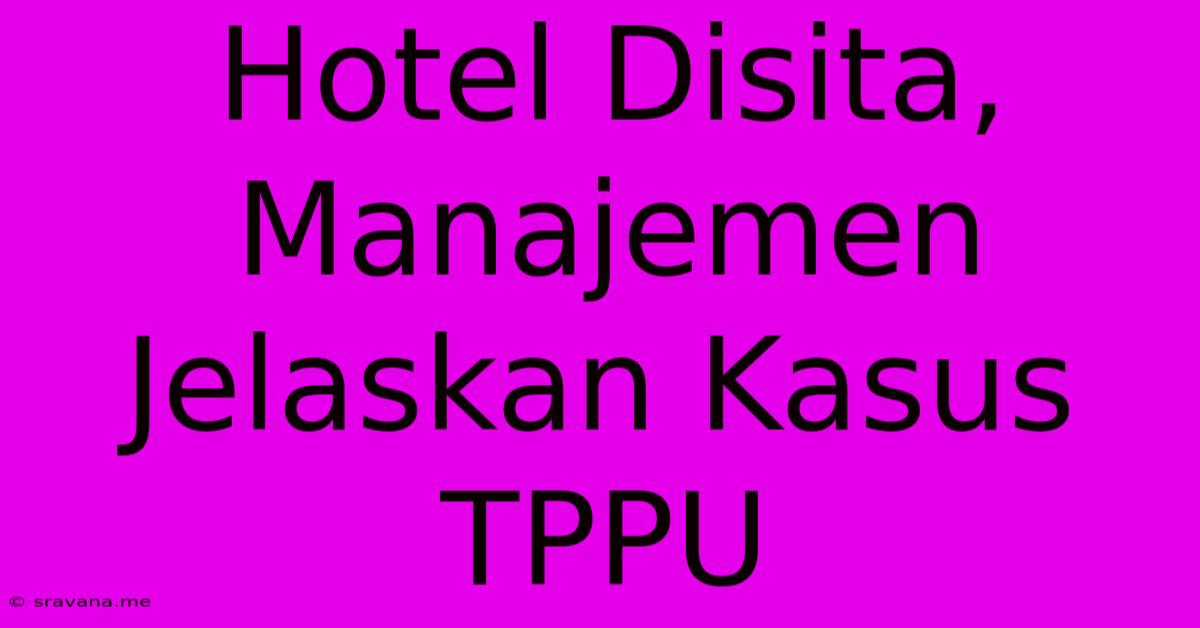Hotel Disita, Manajemen Jelaskan Kasus TPPU

Discover more detailed and exciting information on our website. Click the link below to start your adventure: Visit Best Website sravana.me. Don't miss out!
Table of Contents
Hotel Disita, Manajemen Jelaskan Kasus TPPU: Unraveling the Mystery Behind the Seizure
The recent seizure of Hotel Disita has sent shockwaves through the Indonesian business community, sparking intense public scrutiny and raising critical questions about money laundering (TPPU) and corporate governance. This article delves into the complexities of the case, examining the allegations, the management's response, and the broader implications for the hospitality sector and Indonesia's fight against financial crime.
Understanding the Allegations:
The core of the issue revolves around allegations that Hotel Disita was involved in a significant money laundering scheme. While specific details remain shrouded in legal proceedings and ongoing investigations, preliminary reports suggest the hotel may have been used to channel illicit funds, potentially through a complex web of transactions and shell corporations. These allegations are serious, carrying significant legal and reputational repercussions for the hotel and its management.
Key Questions Surrounding the TPPU Case:
-
The Nature of the Illicit Funds: The source of the allegedly laundered money is a critical element of the investigation. Determining its origin – whether from drug trafficking, corruption, or other criminal activities – is paramount in understanding the full scope of the crime.
-
The Role of Hotel Disita: Investigators must establish the extent to which the hotel was knowingly or unknowingly implicated. Was it a deliberate participant in the money laundering scheme, or was it unwittingly used as a conduit by unscrupulous individuals?
-
The Complicity of Management: This is perhaps the most critical question. Did senior management have knowledge of the illicit activities and actively participate in them, or were they unaware of the criminal use of the hotel's facilities and financial systems?
-
The Effectiveness of Internal Controls: The case highlights the crucial role of robust internal controls and compliance procedures within businesses. Did Hotel Disita have adequate safeguards in place to prevent and detect money laundering? If not, this failure represents a serious lapse in corporate governance.
Management's Response and Explanations:
In the wake of the hotel seizure, management has issued statements attempting to clarify its position and address the allegations. These statements generally emphasize the following points:
-
Cooperation with Authorities: Management usually asserts its full cooperation with the ongoing investigations, offering its complete assistance to uncover the truth.
-
Alleged Lack of Knowledge: Often, statements deny any prior knowledge or involvement in the alleged money laundering scheme. This claim will be heavily scrutinized during the investigation.
-
Strengthening Internal Controls: Management frequently pledges to bolster internal compliance procedures and enhance its anti-money laundering (AML) protocols to prevent future incidents. This is a crucial step in regaining public trust and demonstrating a commitment to ethical business practices.
-
Protecting Stakeholder Interests: Statements often highlight the management's commitment to protecting the interests of employees, investors, and other stakeholders affected by the situation. This demonstrates a concern for the broader impact of the allegations.
Implications for the Hospitality Sector and Indonesia's Fight Against TPPU:
The Hotel Disita case serves as a stark reminder of the challenges faced by Indonesia in its fight against TPPU. The hospitality sector, with its high volume of cash transactions and international clientele, is particularly vulnerable to money laundering activities.
Strengthening AML Regulations and Enforcement:
The case underscores the urgent need for stronger AML regulations and more rigorous enforcement. This includes:
-
Enhanced Due Diligence: Hotels and other businesses need to strengthen their customer due diligence processes to identify and report suspicious transactions.
-
Improved Staff Training: Employees at all levels need comprehensive training on identifying and reporting potential money laundering activity.
-
Increased Collaboration: Closer collaboration between law enforcement agencies, financial institutions, and businesses is critical in effectively combating TPPU.
Lessons Learned and Future Outlook:
The Hotel Disita case provides valuable lessons for businesses across all sectors. It highlights the importance of:
-
Robust Internal Controls: Implementing comprehensive internal controls and compliance programs is no longer optional, but a necessity for mitigating financial crime risks.
-
Transparency and Accountability: Maintaining transparency in financial operations and promoting accountability at all levels of the organization are critical for building trust with stakeholders.
-
Proactive Risk Management: Businesses need to proactively assess and manage their money laundering risks, developing tailored strategies to address their unique vulnerabilities.
The outcome of the investigation into Hotel Disita will significantly influence future regulatory efforts and business practices in Indonesia. It will serve as a case study for other businesses, emphasizing the long-term consequences of neglecting AML compliance and the importance of maintaining ethical and transparent operations.
Conclusion:
The seizure of Hotel Disita and the subsequent allegations of TPPU represent a serious challenge for the hotel's management and the Indonesian business community as a whole. While the specifics of the case remain under investigation, it underscores the crucial role of robust AML compliance, effective corporate governance, and strong regulatory enforcement in combating financial crime. The ultimate resolution of this case will have far-reaching implications, shaping future regulatory efforts and influencing business practices within Indonesia and beyond. Transparency and cooperation with authorities are key to navigating these complex legal challenges and restoring public trust.

Thank you for visiting our website wich cover about Hotel Disita, Manajemen Jelaskan Kasus TPPU. We hope the information provided has been useful to you. Feel free to contact us if you have any questions or need further assistance. See you next time and dont miss to bookmark.
Also read the following articles
| Article Title | Date |
|---|---|
| Hotel Aruss Disita Bareskrim Suasana Terbaru | Jan 15, 2025 |
| Disdik Ikuti Senam Anak Sehat | Jan 15, 2025 |
| Semester Genap Imbauan Untuk Sekolah Singkawang | Jan 15, 2025 |
| Mendikbudristek 7 Kebiasaan Anak Indonesia | Jan 15, 2025 |
| Kasus Tppu Hotel Disita Ini Kata Manajemen | Jan 15, 2025 |
